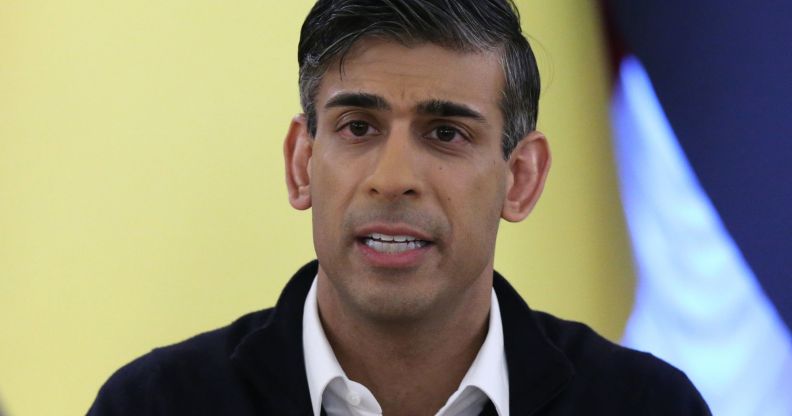Tories would face landslide loss in general election, poll suggests

Polling suggests that things arent looking good for the conservative leadership. (Getty)
The clock is ticking for the Conservative government after a newly released poll suggests a general election would result in a landslide loss for the Tories, and sweeping wins for Labour.
The YouGov MRP poll published on Monday (15 January) suggests that, if a hypothetical election were held tomorrow, the Conservatives would lose a whopping 196 seats, dropping to just 169.
The Labour Party, meanwhile, would waltz into 10 Downing Street with a 385 Commons seats victory – a 183-seat increase since the 2019 election, according to polling.
A shift in power of this calibre hasn’t been seen since 1997, in which Sir Tony Blair bagged the prime ministership with 418 seats won, compared to then-Tory leader John Major’s 165-seat loss.
Lib Dems would also reportedly see a slight seat increase of 37, putting them in third place with 48 seats.

The data, which was commissioned by the Conservative Britain Alliance think tank, shows a stark contrast to the 2019 general election results, which saw Labour fall in second place with 202 seats, while the Conservatives maintained their leadership with a 365-seat win.
This comes after prime minister Rishi Sunak said he was working on the assumption that a general election would be called “in the second half of this year.“
While speaking to broadcasters in early January, Sunak declined to rule out a May general election but reiterated that he intends to “keep going” until later in the year.
The MRP model, YouGov wrote, used the newly mapped parliamentary constituency boundaries, the first to be used in the upcoming general election.
The newly plotted 650 constituencies have not been used in an official general election, although research has been done to predict how the boundary changes would have affected the 2019 election.
On behalf of BBC News, ITV News, Sky News and the Press Association, Ralling and Thrasher found in research that Labour would require a higher seat swing to win under the new constituency changes.
It also found that the Conservative win would have been 14 seats larger compared to the 2019 election results under the previous boundaries.
Under the new boundaries, Labour leader Keir Starmer would need a net gain of 125 seats for a majority win.
How would LGBTQ+ rights fare under a Labour government?
Keir Starmer’s shaky approach to LGBTQ+ rights has left activists concerned and equally confused about how they would fare under his leadership.
While the Labour leader has previously come out in support of the LGBTQ+ community during Pride and other events, his various statements, particularly against trans people, have left voters concerned.
In April, Starmer was criticised for responding to an anti-trans dogwhistle by saying “for 99 per cent of women, it is completely biological … and of course, they haven’t got a penis.”
During an interview with the Sunday Times, he continued that he supposedly agreed with plans to force schools to ‘out’ closeted trans youth by saying he would “want to know” if his child identified as trans.
“I say that as a parent,” he said. “I would want to know and I think the vast majority of parents would want to know.
“That’s why we have to have national guidance on it and they should try to make it cross-party, because it’s not helpful to parents or schools to have this as just a toxic divide when what’s needed is practical, common sense advice.”

When confronted with the backlash he had received during an interview in July, Starmer said: “A woman is an adult female, so let’s clear that one up.”
Despite heavy criticism against its treatment of trans topics and the increasing issue of transphobia within the Labour party, MPs have still vowed to impose protections for LGBTQ+ people, including a ‘trans-inclusive‘ conversion therapy ban.
Deputy Labour leader, Angela Rayner, also showed her support for LGBTQ+ people during the 2023 PinkNews Awards, saying that the last decade has been “especially challenging” for the LGBTQ+ community.
“I am sure many of you in this room have experienced or know someone who has experienced such unacceptable discrimination based on who they choose to love.
“We cannot go on like this,” she continued.

